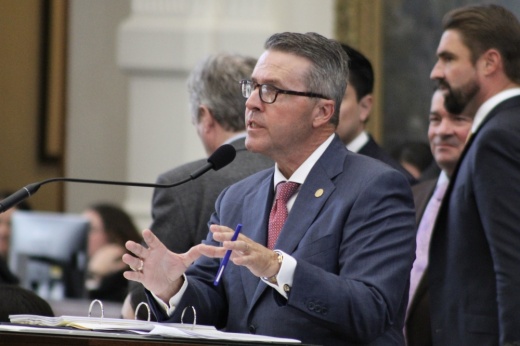House Bill 2 would increase base school funding—known as the basic allotment—by $395; overhaul how the state funds special education; and give school districts money for educator certification. The proposal would also direct schools to raise salaries for teachers and other staff.
“This is more money for Texas public education than any other piece of legislation in the history of the state,” bill author Rep. Brad Buckley, R-Salado, said on the House floor April 16. “Every district gains substantial resources going forward as a result of this bill.”
HB 2 initially passed in a 144-4 vote, with four House Republicans voting against the proposal. The House must vote on the school finance bill one more time before it can be sent to the Senate.
State senators have passed multiple school funding proposals this legislative session, including a bill that would increase salaries for teachers with at least three years of experience. Bills must be approved by both legislative chambers before they can become law.
The overview
HB 2 would raise the base amount of money schools receive per student, known as the basic allotment, from $6,160 to $6,555. Under the bill, the basic allotment would be automatically increased every two years, based on property value growth.
During debate on the bill April 16, some House Democrats said they were concerned HB 2 would not do enough for public schools. Raise Your Hand Texas, a public school advocacy organization, has estimated Texas would need to increase the basic allotment to at least $7,500 to keep pace with recent inflation.
“I would vote for a $1 increase for our public schools, and so I do want to acknowledge that this is a good step forward,” Rep. James Talarico, D-Austin, said April 16. “But ... I don't want to over-promise the people of Texas what this bill would do.”
Talarico repeatedly asked Buckley if HB 2 would bring school districts to 2019 funding levels. State lawmakers last adjusted the basic allotment in 2019, raising it from $5,140 to $6,160.
“The inflationary environment that our districts have had ... created tremendous gaps and loss of money,” Buckley said. “I believe that this is a bipartisan effort to close the gap.”
Zooming in
The bill would expand the portion of the basic allotment that schools must spend on teacher salaries. Current state law stipulates at least 30% of any increase to the basic allotment be used to raise salaries for nonadministrative staff, such as teachers, nurses and counselors. HB 2 would expand that to 40%—at odds with the Senate’s teacher pay plan, Senate Bill 26, which proposes eliminating the restriction.
Buckley’s bill would also increase funding for the Teacher Incentive Allotment, a program designed to put teachers on the path to a six-figure salary.
Under HB 2, Buckley said teachers would see raises “anywhere from about $3,500-$7,000, but it could be more from district to district.” The bill would require districts to prioritize salary increases for teachers with five or more years of classroom experience.
“One of the things that we have done in Texas is ... we have changed the starting salary, but we've not invested in our more experienced teachers,” Buckley said.
Rep. Terri Leo Wilson, R-Galveston, said she believes HB 2 would be a “a transformational investment in Texas public education.” Leo Wilson is a former public school teacher.
“The most important part of this bill is that every piece of it prioritizes the classroom. Teachers and students are where the money should go,” Leo Wilson said. “House Bill 2 is not just an investment in numbers—it's an investment in the future of every child in Texas.”
More details
HB 2 would also provide school districts funding to help current and prospective teachers become certified.
During a Feb. 25 committee hearing, Texas Education Agency Commissioner Mike Morath told House lawmakers that teacher certification was “an area worthy of significant attention” this session.
“We have, in the last three years, gone almost entirely to hiring uncertified teachers—the majority of first-year teachers are now uncertified,” Morath said. “We are setting these folks up for a very rough ride.”
Of the 49,400 teachers hired in Texas during the 2023-24 school year, over 17,000 of them were uncertified, according to TEA data. To address this issue, HB 2 would give districts one-time payments of $1,000 for every uncertified teacher who becomes certified by the end of the 2025-26 school year.
Districts would also receive $8,000 per year for “grow your own” programs, under which schools could provide teacher preparation education for high school students and help current employees acquire 60 hours of college credit to become certified teachers.
HB 2 would also prohibit districts from hiring uncertified educators to teach core subjects, such as math, English, social studies and science.
Also of note
Buckley said HB 2 would allocate about $1.5 billion in new funding for special education. The proposal would overhaul special education funding to allocate resources based on students’ individual needs, rather than where they receive services. In a December 2022 report, the Texas Commission on Special Education Funding said switching to this funding model would "effectively account for the unique, individualized needs of students with disabilities.”
Additionally, the bill would increase funding for prekindergarten and emergent bilingual students.
Stay tuned
House lawmakers also debated Senate Bill 2, a proposal that would give families public money to pay for private education, on April 16. That bill is a top priority of Gov. Greg Abbott and other state Republican leaders, although it has received pushback from House Democrats and some public school districts.
The Texas Senate passed SB 2 on Feb. 5. During an April 3 meeting, the House Public Education Committee amended the bill and sent it to the full House. House members were discussing proposed amendments to SB 2 as of press time.





